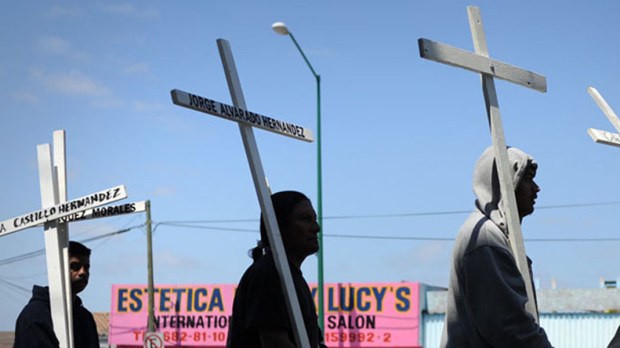Be alert in the face of the swell of racism and xenophobia, even among Catholics! This is the warning of Fr. Pat Murphy, a priest who was born in New York, but who lives on the border between Mexico and the United States of America, in Tijuana, where the Scalabrinian priests take in deportees. When you listen to Fr. Pat, you understand immediately that building walls isn’t a solution at all. These days, he has been at the SCALA (Latin American Catechetical Society) catechetical conference at Boston college, where Aleteia was able to interview him.
Migrant, deportee, refugee … What’s the difference among them, when they arrive at the Casa del Migrante (“House of the Migrant”)?
To begin with, I’ll define the three words, from the perspective of Casa del Migrante. We understand a migrant to be any person who has left his place of origin—whether it be for economic motives, or due to violence, lack of opportunity, poverty, natural disasters, or political instability, among others—with the goal of settling in another place, seeking a better quality of life for himself and his family.
Deportee: Any Mexican who has lived in the United States or who has tried to cross the border, undocumented in either case, and who has been detained and deported by American migration authorities, whether the deportee has returned voluntarily or was expelled immediately.
Refugee: any person who is not Mexican and who has been recognized by Mexican migration authorities as a “refugee,” with the understanding that he or she cannot return to her country of origin because her life is in danger, whether because of her race, religion, nationality, gender, belonging to a determined social group, or political opinions.
In our case, 90 percent of the people we serve are migrants deported from the USA. Many were arrested for minor offenses; others were deported after completing their jail sentences, and still others were detained during their attempt to cross the border without documents. Some are also Mexicans traveling from the south of Mexico, who are trying to settle in Tijuana or cross into the United States.
Some people you take in are from Central America.
Right. The remaining 10 percent consists of foreigners, mostly from Central America, who are fleeing violence in their countries of origin. Some are undocumented, and others have already been officially recognized as “refugees” and have a Mexican residence permit or a visa for humanitarian reasons. A few others have arrived from African nations (Congo, Ghana, Nigeria, and Sierra Leone, among others).
The situation of the Haitians is a special problem; they are not “refugees” as such, because they have not been recognized by the authorities under that title. They all arrived a year ago without documents, and now, those who decided to stay in Tijuana have done the paperwork to obtain a visa to be able to reside there legally.
And all of this is free?
For us, receiving migrants from these different sources is quite a challenge, which demands constant improvement and transformation of the services we offer for free to migrants. Our goal is that our services help attend each of the needs proper to each group (deportees, displaced persons, those who are in transit, and those requesting asylum).
You offer them not only food, but also guidance, medical attention, and spiritual support. What is the greatest spiritual need of the people you welcome?
As you rightly say, thanks to 30 years of experience we have consolidated a variety of services to offer to migrants. All of these services are aimed at providing them a bit of support and stability so that they can complete or continue their migration plan (psychological guidance, legal orientation, help finding employment, and social work, among other assistance).
Spiritual guidance is of great importance, because strengthening their faith in God is key for all these people who put their lives in danger or who find themselves in a state of desperation or fear.
We try to alleviate their uncertainty and their concerns about the future, helping them to put their hope in God and his mercy.
As I mentioned earlier, most of the people we receive are Mexicans, and as such, a large percentage profess the Catholic faith; therefore, “going back to practicing religion is equivalent to going back to their roots, going back home.”Knowing that they are not alone on their pilgrimage and that their families are being protected, having a guide so they know what to do, and being assured that forgiveness exists—these are the greatest spiritual needs.
The laws of the USA have gotten stricter. What can we do so that people understand that these laws are inhuman, as well as contrary to the Gospel?
You’ll see that, when intolerance towards migrants is promoted by the president of your country and by various representatives of communities and powerful groups, it is fairly difficult to convince people of the reality of the damage that stricter migration policies and the increase of racism and xenophobia cause to the thousands of migrants from around the world who try to enter the United States every year.
Promoting awareness of these difficulties is a task that requires teamwork among the authorities on both sides of the border, the media, civil society organizations, and migrants themselves.
There are Catholics who see nothing wrong with the wall. What would you say to them?
The United States is building walls; we are building bridges. The huge wall that President Trump intends to build goes beyond a simple construction; it represents an enormous message of hate, and incarnates the wall in the hearts of thousands of racist and xenophobic people.
Our duty as Catholics is to profess God’s love and generosity towards our brothers and sisters, not division and rejection of them. Migrants aren’t a threat; on the contrary, they are hard-working, honest people, with dreams, who are a source of cultural progress. They only want to have a dignified and safe life for themselves and their families.

